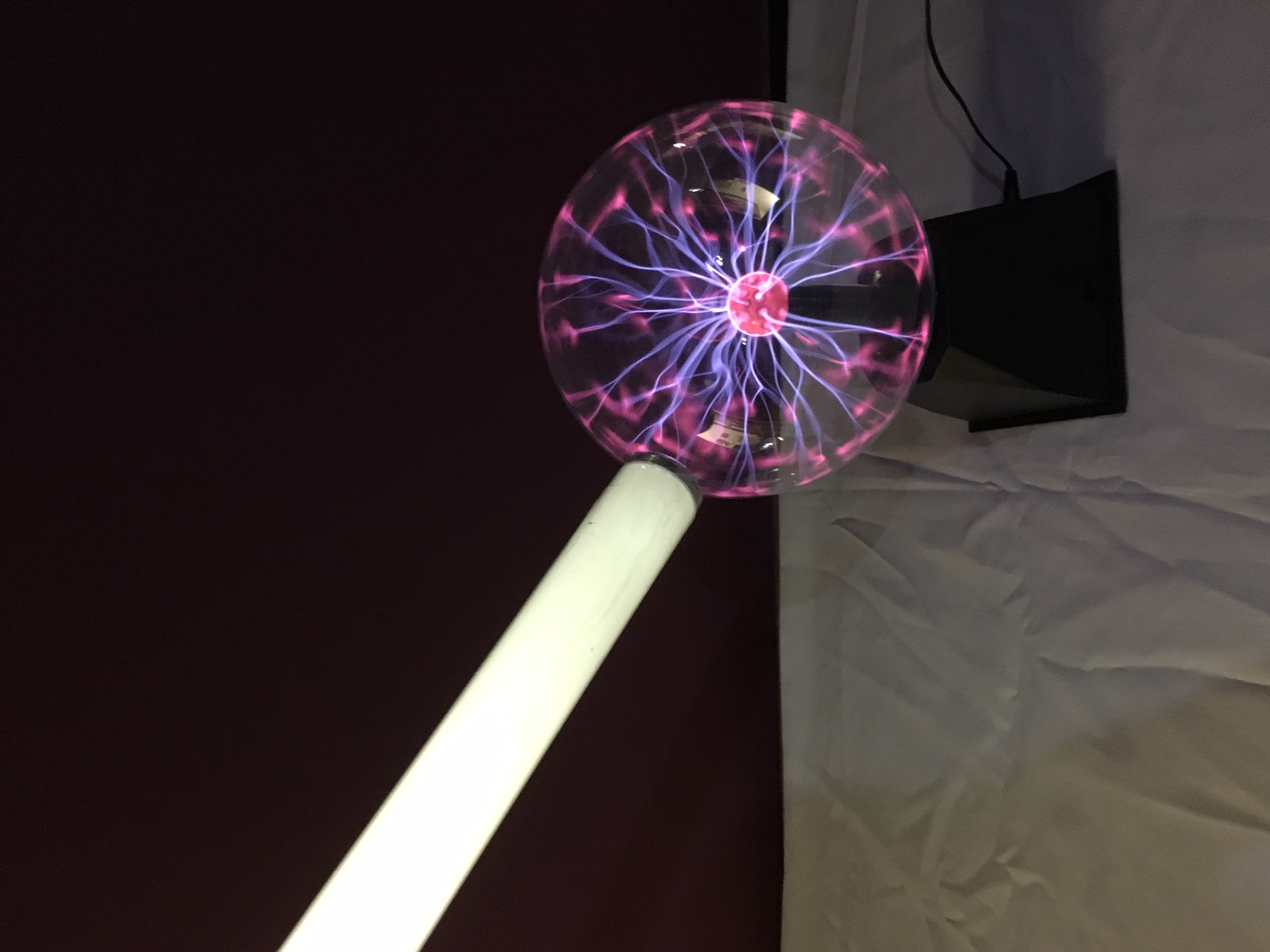Difference between revisions of "Plasma Ball"
From UO Physics Demonstration Catalog
(Created page with "{{NewDemo|subject=Electricity and Magnetism|topic=Electric Fields and Potential|file1=plasma.jpg}} Plasma ball lights fluorescent bulb through induction. Plasma attracts to anything connected to ground (hands, light bulbs, etc.). '''Location:''' * Plasma Ball: T-0 * Fluorescent Bulbs: I-2") |
(Major Rewrite) |
||
| Line 1: | Line 1: | ||
{{NewDemo|subject=Electricity and Magnetism|topic=Electric Fields and Potential|file1=plasma.jpg}} | {{NewDemo|subject=Electricity and Magnetism|topic=Electric Fields and Potential|file1=plasma.jpg}} | ||
Plasma ball lights fluorescent bulb through | {{NewDemo|subject=Electricity and Magnetism|topic=Electric Fields and Potential|file1=plasma.jpg}}Plasma ball lights fluorescent bulb Through conduction from the ball.. Basically . Like a Tesla Coil with a glow tube. It operates on a high voltage that is oscillating at a frequency around 40kHz. The glass is an insulator hut current flows because of the high frequency so the capacitive reactance is low so placing the fluorescent bulb near the ball will make a very small current flow from the ball through the bulb and the person holding the bulb to ground. | ||
Visible Plasma current attracts to anything connected to ground (hands, light bulbs, etc.). | |||
FUN DEMO. Have a student hold the fluorescent bulb in the left hand and have them place their right hand on the bulb. Then you grab the bulb around the midpoint, and the bulb will light. Slide your hand down the bulb, and the light will follow your hand. he student is at high potential (a student's potential is always high) and you ar at a lower potential (ground) so the bulb lights. If you now put your hand on Plasma Ball, the light will go out because you are both at the same potential. Show the concept that current must have a difference of potential to flow, | |||
'''Location:''' | '''Location:''' | ||
Revision as of 15:01, 11 January 2023
Return to Electric Fields and Potential
Description:Return to Electric Fields and Potential
Description:Plasma ball lights fluorescent bulb Through conduction from the ball.. Basically . Like a Tesla Coil with a glow tube. It operates on a high voltage that is oscillating at a frequency around 40kHz. The glass is an insulator hut current flows because of the high frequency so the capacitive reactance is low so placing the fluorescent bulb near the ball will make a very small current flow from the ball through the bulb and the person holding the bulb to ground.
Visible Plasma current attracts to anything connected to ground (hands, light bulbs, etc.).
FUN DEMO. Have a student hold the fluorescent bulb in the left hand and have them place their right hand on the bulb. Then you grab the bulb around the midpoint, and the bulb will light. Slide your hand down the bulb, and the light will follow your hand. he student is at high potential (a student's potential is always high) and you ar at a lower potential (ground) so the bulb lights. If you now put your hand on Plasma Ball, the light will go out because you are both at the same potential. Show the concept that current must have a difference of potential to flow,
Location:
- Plasma Ball: T-0
- Fluorescent Bulbs: I-2
